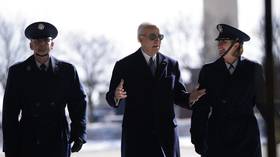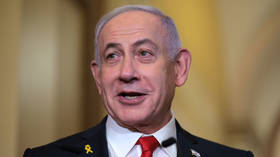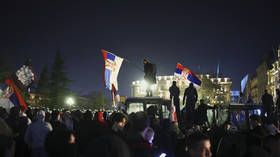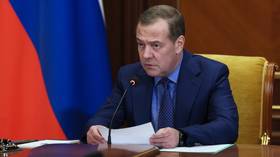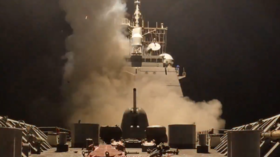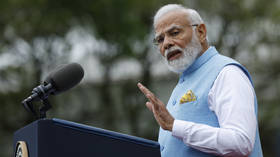Mutual benefits between Russia and U.S. are in spotlight
Expectations are high prior to Barack Obama's visit to Moscow, despite long-running sticking points such as U.S. plans for missile defence in Eastern Europe and NATO's eastward expansion.
The visit of U.S. President Obama to the Russian capital hasn’t even begun, yet he has already exchanged prickly remarks with Russia’s Prime Minister, Vladimir Putin.
“Prime Minister Putin still has a lot of sway in Russia. I think it’s important that, even as we move forward with President Medvedev, that Putin understands that the old cold war approach to U.S.-Russian relations is outdated,” said Obama prior to his meeting with Dmitry Medvedev.
Learning of the Obama statement, Vladimir Putin reacted to this comment in his typical style.
“We are not standing one foot in the past and another in the future – we cannot be doing splits. Instead, we are standing firmly on our feet facing towards the future,” said Vladimir Putin.
“If we see some new steps in other directions, for example if our American partners give up on their plans to deploy anti-missile defense systems in Europe or reconsider their position on the expansion of military blocks, or even abandon the idea of military expansion at all, that would be great progress, of course,” added Putin.
Mutual benefits in focus
But the U.S. President is still likely to focus on mutual benefits between Russia and the U.S., rather than on stumbling blocks between the two.
“The U.S. is not seeking antagonistic relations and wants cooperation on nuclear non-proliferation, fighting terrorism and energy issues,” Obama said prior to the meeting.
In a new entry on his video blog, Russian President Dmitry Medvedev has expressed the same vision and similar expectations for the upcoming high-level talks:
“There are problems that we simply cannot resolve on our own, acting unilaterally. This is true, above all, of international security: including the fight against terrorism, extremism, proliferation of weapons of mass destruction and drugs trafficking.”
Still, Obama had to admit that bilateral relations have worsened in recent years and are characterized by “a crisis of confidence, lack of action and unwillingness to take any new steps”. At the same time, he expressed hope that this crisis can, and should, be overcome.
Let’s start the ball rolling
There are hopes that president Obama’s visit to Moscow will be as intensive as it is extensive. The groundwork has been laid and now it’s time to get down to business.
“We’re covering a lot of issues, on some of which we agree and on some of which we don’t. It’s that contact and dialogue and cooperation which are so critical, including the one on missile defense,” earlier said Admiral Michael Mullen, chairman of the US Joint Chiefs of Staff.
Talks on a new Strategic Arms Reduction Treaty (START) are underway, but Russia sees the scrapping of the U.S. plans for an anti-missile defense shield in Eastern Europe as crucial to the success of the talks.
It has been a major sticking point for a long time and Putin and Bush gave it a go. Now Obama and Medvedev have their turn.
Russia still sees the AMD deployment as a threat to its national security and the U.S. still says the threat is not against Russia.
“The missile defense that we've talked about deploying is directed towards not Russia, but Iran. That has always been the concern, that you had potentially a missile from Iran that threatened either the United States or Europe,” said President Obama.
At the same time, some in the U.S. are opposed to the AMD plans.
A group of prominent scientists, including Nobel laureates, on Thursday released a joint letter urging President Obama not to deploy any part of the proposed U.S. missile defense system in Europe. Their reasons, however, were not political – the letter said the AMD system has not proven effective under real-world operating conditions.
“This technology has not been adequately tested and has no demonstrated capability in a realistic attack scenario,” the scientists' letter stated. “None of the AMD tests have included realistic countermeasures or tumbling warheads. All flight intercept tests have been conducted under highly scripted conditions with the defense given advanced information about the attack details.”
Speaking in the Russian Public Chamber in Moscow, the U.S. Ambassador to Russia, John Beyrle, explained why the new disarmament treaty is so important.
“This is our highest priority, since 75% of all nuclear warheads in the world are shared between our two countries. If we agree to further reduce our nuclear arsenals, it will send a very important signal to the rest of the world,” Beyrle said.
American columnist Craig Roberts believes Washington does expect concessions from Moscow.
“I don’t think that Obama will take away the missile bases that he wants to put in Poland, the radar that he wants to put in the Czech Republic or that he will retreat from trying to bring Georgia and Ukraine into NATO. So whatever happens, for improved relations that will have to come from Moscow’s concessions to Obama,” Roberts told RT.
So far, the U.S. has not been willing to make AMD a part of the START deal, and believes the issues should be independent. Yet there's optimism Obama's visit could get things off on the right foot.
“Certainly we will not see a successful signing of a new binding START treaty, but the signals we are receiving from the negotiating teams are quite positive,” said Boris Makarenko from the Centre for Political Studies.
Meanwhile, ahead of the meeting, Russia’s Foreign Minister Sergey Lavrov expanded on how the work on this problem would proceed.
“As for the U.S.-Russian talks on the Strategic Arms Reduction Treaty (START), these talks are continuing constructively and effectively. The report [on the results of talks] will be presented by both presidents – Dmitry Medvedev and Barack Obama – when they meet on July 6 in Moscow. We expect the presidents to acknowledge, on the record, that work already achieved, and confirm their commitment on concluding the remaining work by December of this year when the current agreement has expired,” Lavrov told journalists.
Also, both countries have agreed to slash their nuclear arsenals, but how and to what extent are still big questions.
“We do not have a hostile attitude towards Americans. We do not want to build our relationship based on confrontation, and we want to reset our relations,” says Mikhail Margelov, the Chairman of the International Affairs Committee of the Federation Council.
Read also Barack Obama to stay at 13,000-dollar luxury suite at Moscow's Ritz-Carlton Hotel



